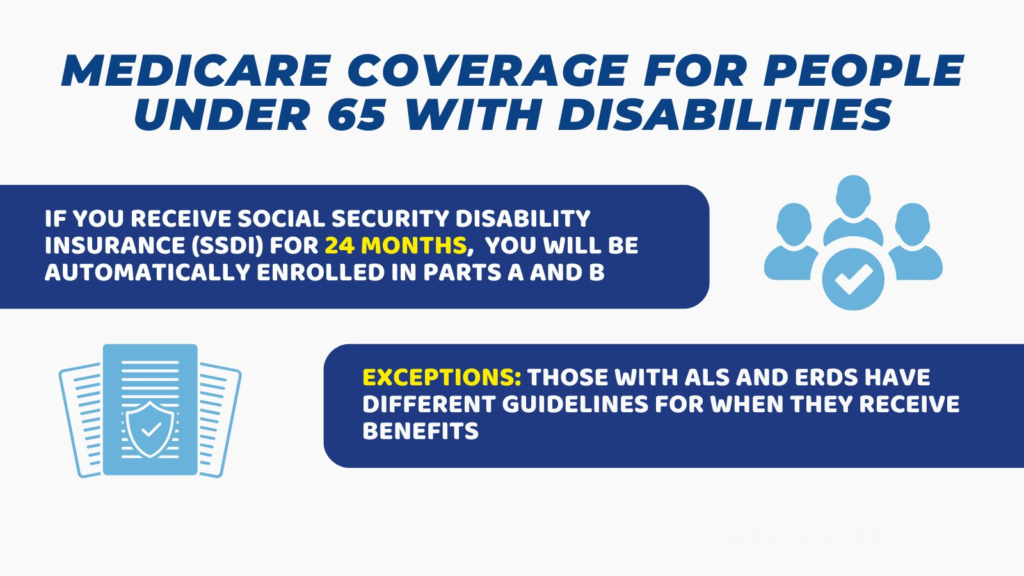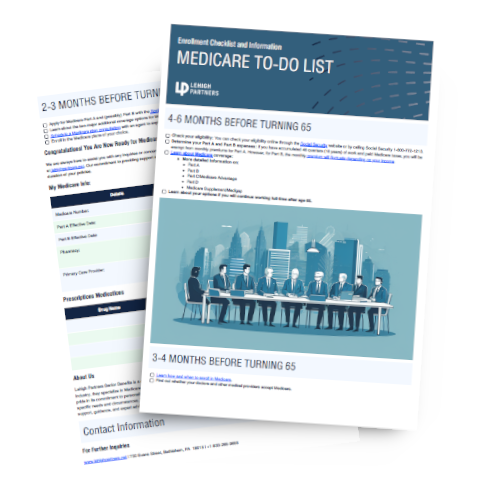Medicare is a federal health insurance program primarily designed for individuals aged 65 and older. However, it also provides coverage for those under 65 who are disabled. This article aims to elucidate the workings of Medicare for people with disabilities and guide them on enrolling in Medicare Advantage or Medicare Supplement plans.
- Eligibility for Medicare under 65 with Disabilities
To qualify for Medicare under 65 due to a disability, individuals must meet certain criteria. First, they must have received Social Security disability benefits for at least 24 months. Second, the disability must be approved by the Social Security Administration (SSA) based on defined medical conditions. Additionally, those with Amyotrophic Lateral Sclerosis (ALS) or End-Stage Renal Disease (ESRD) are also eligible to enroll in Medicare, irrespective of the duration of disability benefits received. - Medicare Parts A, B, C, and D for Individuals with Disabilities
Like Medicare for older adults, Medicare for people with disabilities consists of different parts. Part A covers hospital stays, skilled nursing facility care, and some home health services. Part B covers doctor visits, preventive services, and outpatient care. Both Part A and Part B are often referred to as Original Medicare.
Medicare Part C, or Medicare Advantage, offers an alternative way to receive Medicare benefits through private insurance companies approved by Medicare. These plans provide all the benefits of Parts A and B and often include prescription drug coverage (Part D), along with additional benefits like vision, dental, or hearing coverage.
Medicare Part D is standalone prescription drug coverage that beneficiaries can purchase alongside Original Medicare or as part of a Medicare Advantage plan. Part D helps reduce costs for prescription medications.
- Enrollment Periods and Eligibility for Medicare Advantage and Medicare Supplement Plans
For individuals with disabilities, the initial enrollment period (IEP) begins three months prior to their 25th month of receiving disability benefits and continues for seven months. This window allows them to enroll in Medicare Parts A and B. However, during this period, they can choose to enroll in a Medicare Advantage plan (Part C) or a Medicare Supplement (Medigap) plan as well.
Medicare Advantage plans usually have specific enrollment periods, including the initial and annual enrollment periods. The initial enrollment period occurs during the IEP, while the annual enrollment period takes place between October 15th and December 7th each year.
Medicare Supplement plans, on the other hand, have different rules regarding enrollment. In most states, individuals under 65 with disabilities have a one-time enrollment opportunity when they first become eligible for Medicare. After this period, enrollment options may be limited or vary by state.
- Choosing Between Medicare Advantage and Medicare Supplement Plans
Deciding between Medicare Advantage and Medicare Supplement plans can be challenging. Medicare Advantage plans offer a comprehensive package of benefits, including prescription drug coverage, at potentially lower costs, but they generally have more limited provider networks.
Medicare Supplement plans, on the other hand, work alongside Original Medicare to cover the out-of-pocket costs, such as deductibles, copayments, and coinsurance. These plans typically offer a wider choice of doctors, but prescription drug coverage is excluded and must be purchased separately.
What Medicare Benefits are Available for People with Disabilities?
The full range of Medicare services is available for those who qualify! This includes hospital, nursing home, home health, and physician services, regardless of whether they relate to the individual's disability.
Understanding how Medicare works for individuals under 65 with disabilities is crucial for ensuring comprehensive healthcare coverage. Choosing the right plan, whether it be Medicare Advantage or Medicare Supplement, requires careful consideration of individual needs, budget, and desired coverage. By navigating the enrollment periods and evaluating options, beneficiaries can make informed choices to optimize their healthcare coverage and lead healthy and fulfilling lives.

Medicare is not just for people under 65. You may be eligible for Medicare if you have a disability.
Looking for expert assistance with your Medicare enrollment and finding the right coverage?
Contact Lehigh Partners Senior Benefits today! Our dedicated team is here to support and guide you through the process, whether you need help with Medicare Advantage Plans, Part D prescription coverage, or Medicare Supplement options. Don't navigate Medicare alone - reach out to Lehigh Partners Senior Benefits and give yourself peace of mind with personalized, reliable assistance. Call us now at 833-265-9655 schedule a consultation and explore your Medicare coverage options.
Here are some additional resources related to Medicare and disabilities:
- Centers for Disease Control & Prevention: Provides valuable information on disability and its impact in the United States through a printable infographic.
- Medicare: Visit the official Medicare website for comprehensive information on how Medicare works with Social Security Disability and additional resources for people with disabilities.
- Centers for Medicare & Medicaid Services (CMS): Offers new materials aimed at helping unions and employers with Medicare-related decisions for employees. Find the materials at CMS employer and union publications.
- Social Security Administration: Learn how to apply online for disability benefits and access the SSA booklet "What You Need to Know When You Receive Social Security Benefits" (PDF version).
- usa.gov: This website provides a wealth of resources for individuals with disabilities, including guides covering topics such as disability benefits, housing assistance, job training programs, financial help, home health care, caregiver programs, assistive technology, and more.
These resources will provide you with valuable information and assistance regarding Medicare, disability benefits, and related topics.

